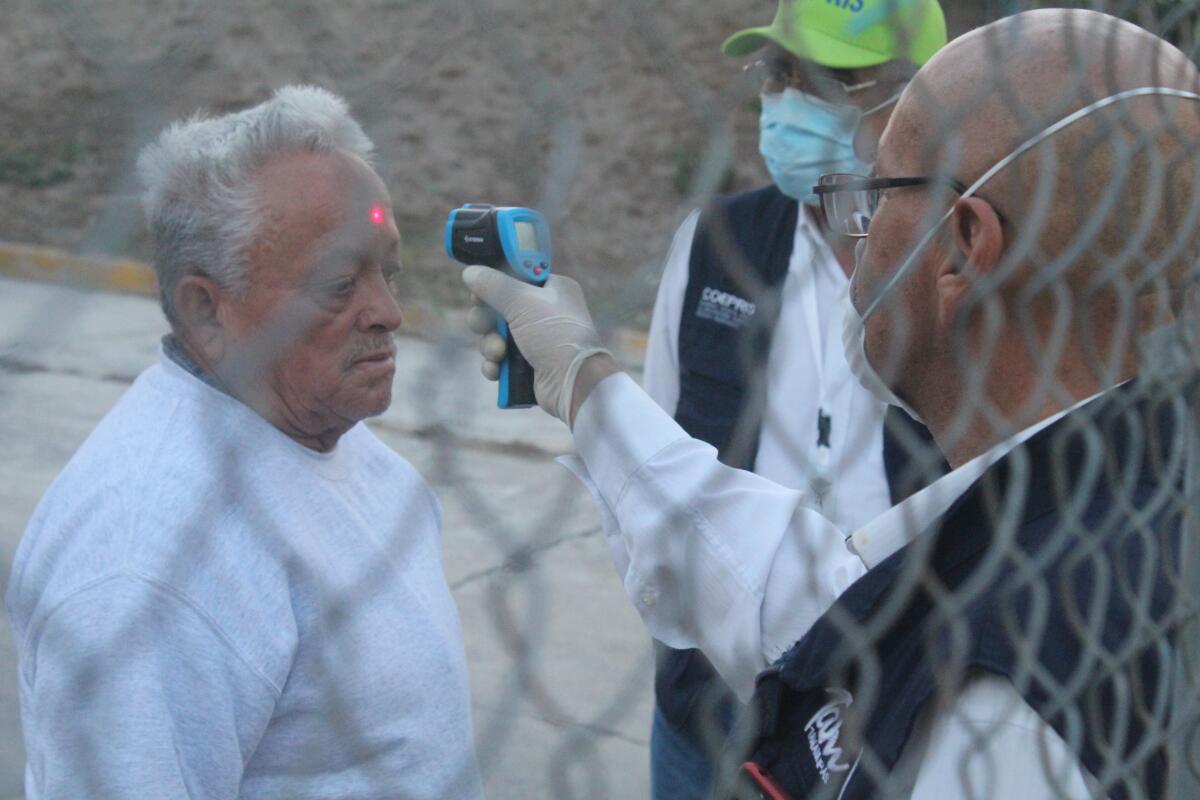Coronavirus outbreak at migrant shelter in Mexico linked to U.S. deportee

- Share via
MEXICO CITY — A Mexican citizen deported from the United States is the suspected source of a coronavirus outbreak at a shelter in the city of Nuevo Laredo, Mexican authorities said Monday.
At least 14 other migrants at the shelter were infected in what appears to be the first outbreak in Mexico linked to a deportee from the United States, a scenario long feared by Mexican health authorities and migrant advocates.
More tests were being conducted to determine if other migrants or staff at the shelter had been infected, according to the health department in Tamaulipas state, which includes Nuevo Laredo and other communities across the border from Texas.
Authorities said the deportee — whose name, age and gender were being withheld — arrived at the shelter unaware of having been infected. All 15 migrants with the virus have been placed in isolation.
The Trump administration has continued its policy of aggressively removing migrants and would-be asylum seekers despite widespread concerns that the practice is spreading the virus from the United States, which has the most cases in the world.
Guatemalan President Alejandro Giammattei said Sunday that at least 50 migrants deported by the United States to the Central American nation have tested positive. They account for more than a sixth of the 289 cases confirmed across the country.
On Monday, Reuters reported that three migrants recently deported from the United States to Haiti had tested positive for coronavirus while in quarantine in the Caribbean nation.
“The Trump administration is essentially spreading a global pandemic to countries and communities less capable of managing an outbreak,” said Ariana Sawyer, a researcher for Human Rights Watch.
The U.S. government, which gives migrants basic health screens before removing them but does not test them for coronavirus, has not confirmed removing any migrant who is infected.
Neither Immigration and Customs Enforcement nor Customs and Border Protection returned requests for comment on the reports from officials in Mexico and Haiti.
U.S. authorities have defended the removal policies as both a deterrent to illegal immigration and a way to contain the spread of coronavirus in the United States.
But the practice has swelled the ranks of U.S.-bound migrants stranded in Mexican border towns, leaving thousands crammed into shelters, low-rent apartments and rough encampments where social distancing is not possible.
On March 20, U.S. authorities enacted a policy of speedy expulsions along the Southwest border in response to the pandemic. In less than a month, more than 11,000 had been sent back across the Mexican border under the new guidelines. They include asylum seekers and hundreds of unaccompanied minors, groups granted special protections under U.S. law.
Those returns are in addition to the hundreds of Mexican nationals deported each day on suspicion of violating U.S. immigration laws.
U.S. immigration authorities sent back almost 62,000 Mexican citizens between Jan. 1 and April 3, the most recent period for which figures were available, according to Mexico’s interior ministry.
Many had spent weeks or months in U.S. detention centers where rising numbers of infections have been reported.
As of late Monday, ICE had confirmed 220 coronavirus cases among migrants in its custody, more than double the total from Friday, when the agency told lawmakers it had tested between 300 and 400 detainees — about 1% of roughly 32,000 migrants in its custody.
A total of 116 ICE employees have also tested positive, including 30 working in detention facilities.
Mexican officials have instituted health screenings for the steady stream of deportees arriving in Tijuana, Ciudad Juarez, Matamoros and other towns along the border, taking their temperatures and querying them about any symptoms they may have and how long they were in U.S. custody.
Most are then provided bus transportation back to their home regions across Mexico.
Mexico’s immigration agency did not respond to queries Monday asking how many deportees returned by the United States had tested positive for coronavirus.
In the case of the outbreak at the Nuevo Laredo shelter, Mexican health authorities said the suspected carrier of the virus had been deported from Houston.
Those infected at the shelter included citizens of Honduras, Guatemala, Mexico, Cuba and the central African nation of Cameroon, authorities said.
Health officials also said a 21-year-old Mexican man who had been returned by U.S. authorities from Atlanta to the Mexican border city of Reynosa on April 17 had also tested positive for coronavirus.
The administration of Mexican President Andres Manuel Lopez Obrador has been eager to appease the United States, its principal trading partner.
Last year, Mexico agreed to tighten controls on its southern border with Guatemala and agreed to host thousands of U.S.-bound Central Americans asylum seekers and other non-Mexican migrants sent back to Mexico by the United States.
McDonnell reported from Mexico City and O’Toole from Washington. Times staff writer Cindy Carcamo in Los Angeles and special correspondent Cecilia Sánchez in Mexico City contributed to this report.
More to Read
Sign up for Essential California
The most important California stories and recommendations in your inbox every morning.
You may occasionally receive promotional content from the Los Angeles Times.











